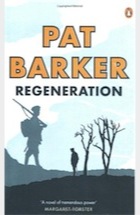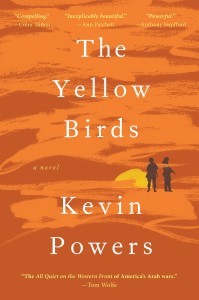Great War Novels for Veterans’ Day
11/7/15 – VETERANS DAY READING: 11 GREAT WAR NOVELS FOR 11/11
There are many ways to honor the men and women who put on a uniform and risk it all for the nations that send them into war in the name of duty and patriotism. One obvious way is to put their stories in writing—fiction or nonfiction—so that others can read and remember the sacrifices they made. Among literature’s many intrinsic values is its ability to give readers a sense of what other people experience, to help us understand, empathize, and learn from the thing that others have done.
What follows is a very personal list of 11 great war novels to commemorate 11/11. This is not your typical “best of” list. I’ve left out the obvious candidates—War and Peace, Catch-22, All Quiet on the Western Front, For Whom the Bell Tolls, The Red Badge of Courage—on the assumption that you’ve already read those. Instead we’re offering a list of equally thought- provoking works that honor our soldiers as well as the friends and families left behind. They’re hardly unknown, but there’s bound to be a few here that you’re not familiar with. They are listed alphabetically by author:
![]()
![]()
 Regeneration by Pat Barker is the first book in a World War I trilogy based on the actual psychiatric treatment of British military officers suffering from shell shock, including poets Sigfried Sassoon and Wilfred Owen. Barker’s technique allows her to describe the war through the words of those who suffered its unmitigated mental and physical horrors, and the physicians who struggled to help them.
Regeneration by Pat Barker is the first book in a World War I trilogy based on the actual psychiatric treatment of British military officers suffering from shell shock, including poets Sigfried Sassoon and Wilfred Owen. Barker’s technique allows her to describe the war through the words of those who suffered its unmitigated mental and physical horrors, and the physicians who struggled to help them.
Corelli’s Mandolin by Louis de Bernières is a tale of love and war during the Italian and German occupation of the Greek island of Cephallonia in the Second World War. Captain Corelli is a reluctant officer who gets caught in the worst kind of dilemma when he falls in love with a willful, beautiful young woman. The language is haunting, the mood overpowering.
Cold Mountain by Charles Fraser aims its spotlight on a disillusioned Confederate soldier who survives a wound that was expected to be fatal. When he recovers and is sent back to the front, he chooses instead to desert and embarks on a dangerous and lonely odyssey through the devastated South.
A Very Long Engagement by Sébastien Japrisot is a World War I epic about the murder of five wounded French soldiers by their own comrades, the coverup that inevitably follows, and the relentless quest of one of the men’s fiancées to find out what really happened. Like most of the great war novels, it brings a better understanding of both the horrors and kindnesses brought about by war.
 Blood Meridian by Cormac McCarthy is set on the Texas-Mexico border in the 1850s. The principal character is “the Kid,” a 14-year-old from Tennessee who witnesses the violence that marked America’s expansion to the West when he hooks up with a gang of murderers who sell the scalps of Native Americans on a burgeoning black market.
Blood Meridian by Cormac McCarthy is set on the Texas-Mexico border in the 1850s. The principal character is “the Kid,” a 14-year-old from Tennessee who witnesses the violence that marked America’s expansion to the West when he hooks up with a gang of murderers who sell the scalps of Native Americans on a burgeoning black market.
History: A Novel by Elsa Morante is the powerful and unforgiving saga of a widowed schoolteacher’s attempt to raise two sons, one a teenager who treats war as his playground, and one born right after the war, the result of a rape by a Nazi soldier. Morante, who spent a year hiding in Italy during the Nazi occupation, is able to focus both on the political events driven by the powerful and wealthy and on the ordinary people struggling to stay alive.
Going After Cacciato is one of several Vietnam War books by Tim O’Brien. He’s better known for The Things They Carried, a short story that brilliantly shines a spotlight on the struggles of a group of infantrymen by examining the objects they carried with them. Going After Cacciato also focuses on the plight of the enlisted (usually drafted) men in Vietnam, this time by tracing the events that ensue after one of them decides to go AWOL and walk from Vietnam to France.
The English Patient by Michael Ondaatje tells the story of four damaged people living out the end of World War II in an Italian monastery: a nameless man critically burned, his Canadian nurse, a Canadian-Italian thief, and an Indian sapper in the British Army. Alternately haunting, harrowing, beautiful, and disturbing, The English Patient slowly weaves these characters together, only to pull them apart in the end.
 The Yellow Birds by Kevin Powers, published just last year, is a graceful novel about the impossible burdens faced by American troops in Iraq. Powers, who enlisted at age 17 and served as a machine gunner in the war, focuses much of the novel on a bloody and ultimately fruitless campaign to control the northern city of Al Tafar. His principal character, a 21-year-old private who feels little purpose or determination, is pushed by a sergeant who enforces his orders with punches and a commanding officer who gives pep talks reminiscent of Patton.
The Yellow Birds by Kevin Powers, published just last year, is a graceful novel about the impossible burdens faced by American troops in Iraq. Powers, who enlisted at age 17 and served as a machine gunner in the war, focuses much of the novel on a bloody and ultimately fruitless campaign to control the northern city of Al Tafar. His principal character, a 21-year-old private who feels little purpose or determination, is pushed by a sergeant who enforces his orders with punches and a commanding officer who gives pep talks reminiscent of Patton.
The Guernsey Literary and Potato Peel Pie Society by Mary Ann Shaffer and Annie Barrows is a delightful book set just after World War II has ended, when civilians and soldiers alike are trying to pick up the pieces of their lives. Shaffer uses letters from the members of a most unconventional book group on the occupied Channel Islands to tell personal war stories that are both touching and inspiring.
August 1914 is the first installment in Aleksandr Solzhenitsyn’s epic Red Wheel narrative about the events before and during the First World War. This first volume examines the assassination of tsarist Prime Minister Pyotr Stolypin, a key event leading to the 1917 Revolution, as well as the start of the war and the disastrous Russian offensive into East Prussia. Told through alternating viewpoints, many in sharp disagreement about the events, the book offers insights on political terrorism as well as war between nations.
That’s our 11 for 11/11. Feel free to add your own suggestions or comments in the space below.
Mark Willen
Mark Willen’s novels, Hawke’s Point, Hawke’s Return, and Hawke’s Discovery, were released by Pen-L Publishing. His short stories have appeared in Corner Club Press, The Rusty Nail. and The Boiler Review. Mark is currently working on his second novel, a thriller set in a fictional town in central Maryland. Mark also writes a blog on practical, everyday ethics, Talking Ethics.com.
- Web |
- More Posts(48)